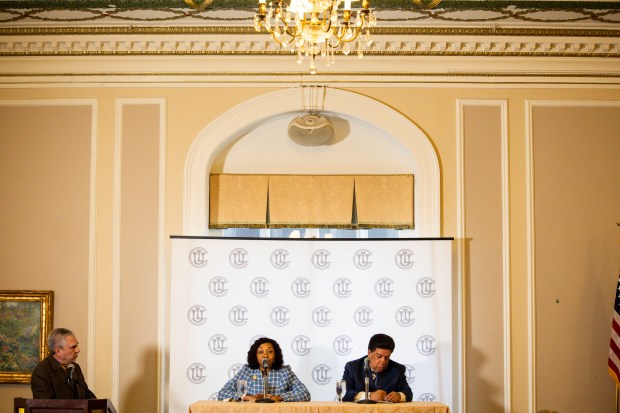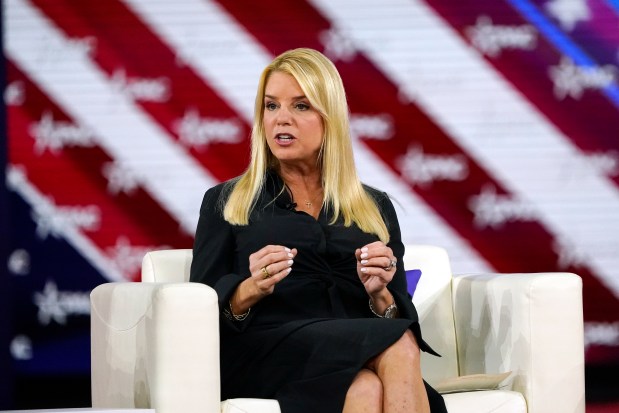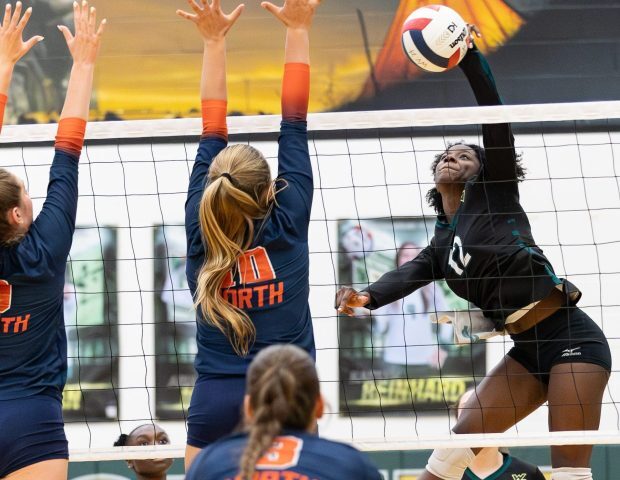With Illinois Supreme Court Justice Joy Cunningham leading the way in both party endorsements and fundraising going into the campaign’s final week, her Democratic primary challenger is staking his bid on the argument that the election is a once-in-a generation chance to put a Latino on the high court.
Supporters of both Cunningham and Appellate Judge Jesse Reyes say choosing an experienced voice for the seat is especially important at a time when state courts could be faced with questions on issues like abortion, criminal justice and immigration.
Given Cunningham’s party backing in the Cook County district race, Reyes’ supporters are also framing him as a candidate free of the party’s control.
“There’s a lack of confidence in the public with the judiciary, and I think we have to work hard to try to reaffirm their prior confidence,” Reyes said in an interview earlier this month.
“I’m looking to provide a voice that I think is needed,” he said.
No Republican candidates have filed for the race, so the winner of the March 19 Democratic primary is likely to win the seat in November, in which case the court’s Democratic 5-2 majority would remain unchanged.
Cunningham was an appellate judge when she appointed to the high court seat in 2022. She has raised close to $800,000 through donations of $1,000 and above this year, on top of the $285,000 she had on hand at the end of last year, according to campaign finance records. Her campaign recently announced a “six-figure” ad buy across television, streaming and digital platforms.
Reyes started the year with about $117,000 in his campaign fund and has brought in around $120,000 in large donations this year, according to campaign records. Senior adviser Xavier Nogueras said the campaign has spent close to $200,000 on digital and TV ads.
Cunningham, who declined to be interviewed, is backed by Cook County Democrats and several unions who have rallied around her as a proven justice who is in tune with Democratic values.
Greg Kelley, president of the SEIU Illinois State Council, described Cunningham as “one of ours,” noting she was well-liked by SEIU members at the Northwestern Memorial System, where she was senior vice president, general counsel and corporate secretary. Cunningham also worked as an associate general counsel for Loyola University Health System and as a nurse early in her career.
“Who’s on the bench really does matter. It matters not just for labor, but it matters for all kinds of rights,” Kelley said. “You run down the list of rights, the importance of justices is just growing.”
The American Federation of State, County and Municipal Employees Local 31, Illinois AFL-CIO, Chicago Teachers Union, Fraternal Order of Police and Illinois Federation of Teachers are also backing Cunningham.
Reyes argues he’s the more progressive candidate, citing a commitment to “providing access to justice.” He pointed to the effort he led as an associate judge to provide multilingual information on the dangers of drinking and driving as one example of that.
He said he’s interested not just in justice “with regards to the parties who are in front of you, but also with regards to society,” meaning he considers underlying issues and overall societal impacts in deciding sentences, including whether supervision or treatment might at times be more appropriate than incarceration.
The contest has surfaced tensions between Black and Latino leaders. In recent weeks, a coalition of Latino groups — the Illinois Latino Agenda, Hispanic Lawyers Association of Illinois and the Latino Leadership Council — lashed out against Cunningham, who is Black, for comments she made on the court’s diversity to The Daily Line.
“I think to suggest that our Supreme Court is not diverse because it does not have a Latino on it, in many respects really makes no sense,” Cunningham told the publication. “I think when the court was completely male and completely white, then you could call it a non-diverse court. But now it has five women; it has three Black people.”
She argued Reyes was suggesting that “every single ethnic group … should have a representative on the court. And of course that’s impossible.”
“What does that say to the Latino community?” Reyes asked in an interview. “You don’t need to apply because it’s already diverse enough.”
Nogueras, the senior adviser, took it a step further, calling Cunningham’s remarks “an incredible insult.”
Cunningham, whose mother was from Panama and whose father was from the Cayman Islands, has said she also values diversity on the court, but also that “the ultimate criteria for who serves on our Supreme Court cannot be ethnicity or race, that or gender.”
Reyes’ supporters say party insiders have passed up multiple opportunities in recent years to get a Latino justice seated on the bench. The races for open seats are crucial because after winning a seat, justices go up for retention votes only once every 10 years.

Retiring justices traditionally select their own replacements, who are then approved by the full court. When Justices Rita Garman and Anne Burke retired in 2022, they respectively selected Republican Lisa Holder White and Cunningham — both Black women — as their replacements. Ward and township committee members last year then backed Cunningham over Reyes for the full term.
Holder White’s district, central and northwest Illinois’ 4th Judicial District, is also on the ballot this year. She is running unopposed.
With Latino judges underrepresented in Illinois circuit courts and appellate courts, it will continue to be difficult down the line to elevate a Latino judge to the Supreme Court, said Juan Morado Jr., a partner at Benesch Law and a member of the Illinois Latino Agenda, a nonpartisan group that does not make formal endorsements.
“Justice Reyes is one of our best opportunities to have representation,” he said.
Latino representation could become particularly important if legal questions related to the influx of asylum-seekers in Chicago eventually rise to the Supreme Court, said Martín Montes, a partner at law firm Barnes & Thornburg and another member of the Illinois Latino Agenda.
“We don’t know what issues may give rise in the near future as a result of the new arrivals that are coming into our city and our state that are predominantly of Latino descent,” he said. “There are those kind of issues that could clearly impact the Latino community here in the state and Cook County.”
Reyes finished second in a seven-person primary race for a Supreme Court seat in 2020, when Cook County Democrats backed Justice P. Scott Neville Jr.
Cunningham grew up in New York City and graduated from the City University of New York. She was previously an appellate judge and an associate judge in Cook County.
Reyes grew up in Pilsen and Bridgeport. He attended the University of Illinois at Chicago, and he was the first Latino justice elected to an appeals court in Illinois. Before that, he was a circuit judge. Both candidates attended John Marshall Law School.
Both candidates have also indicated they are largely aligned with Democratic party values, with both speaking in favor of Illinois’ role in protecting access to abortion, for example.
Cunningham in particular argued in a January candidate forum that state courts “have become the gatekeepers of all the rights we hold dear.”





